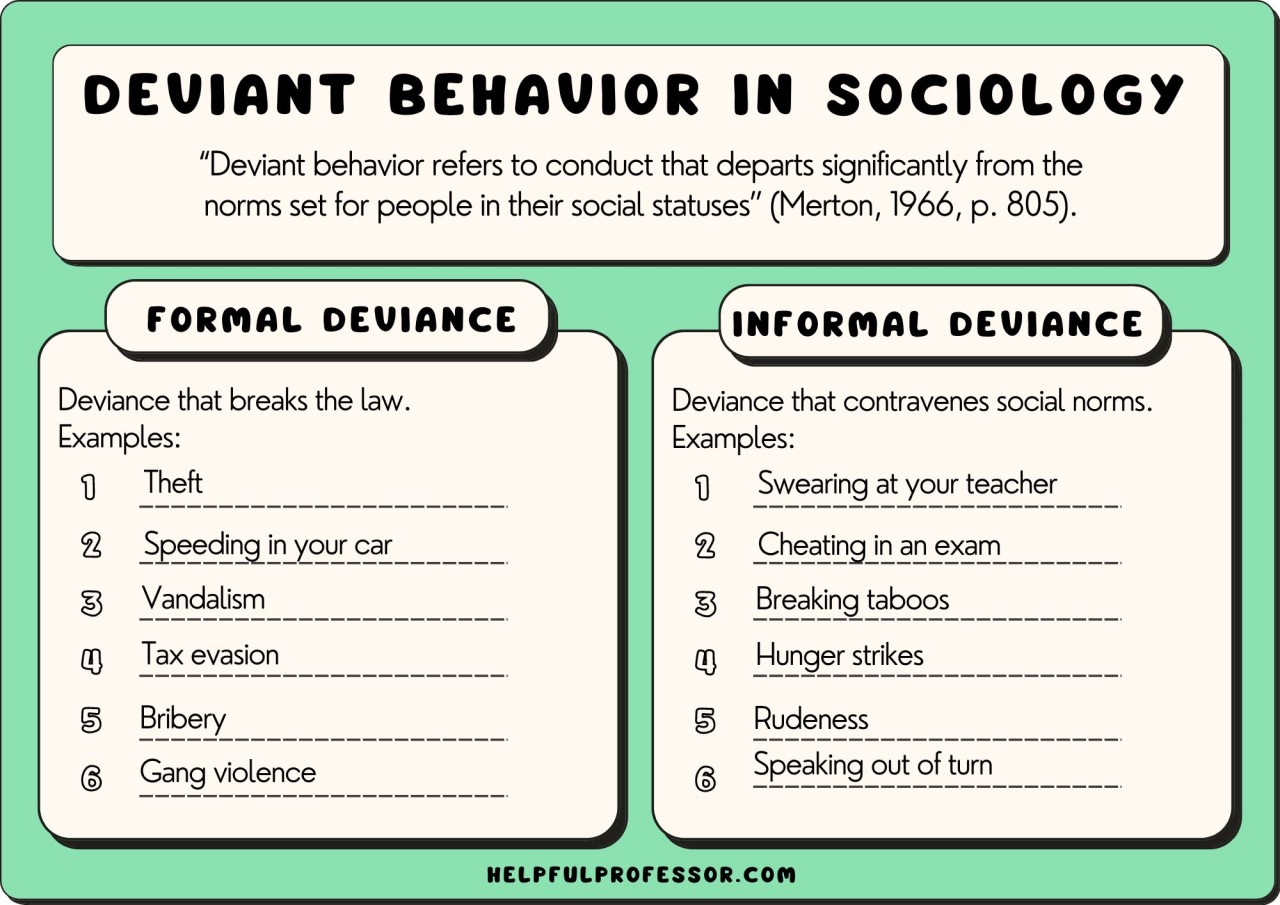Imagine you’re at a crowded party, chatting with a friend. Suddenly, a stranger walks up and starts talking about their most embarrassing moment in graphic detail. You might feel surprised, maybe even a little uncomfortable. Why? Because the stranger has unknowingly violated one of society’s unspoken rules – a social more. These mores, often referred to as “folkways,” influence our behavior in profound ways, shaping our interactions and dictating what is considered acceptable in a particular culture.

Image: helpfulprofessor.com
In this article, we’ll delve into the world of sociology and explore the fascinating concept of mores. We’ll uncover how these unwritten rules guide our everyday lives, how they differ across cultures, and how understanding them can help us navigate social situations with grace and ease.
Defining Mores: The Unwritten Rules of The Game
Mores, in the realm of sociology, refer to the strong, deeply held social norms that dictate what is considered right or wrong in a society. These aren’t merely etiquette guidelines; they encompass values, beliefs, and principles that are fundamental to the functioning and stability of a community. Breaking a more can lead to serious consequences, sometimes even social ostracization, depending on the culture and the severity of the transgression.
Unlike laws that are codified and enforced by legal institutions, mores are often unwritten, passed down through generations, and ingrained in the very fabric of our social interactions. They’re the foundation upon which our societal expectations and moral compass are built.
Examples of Mores: Unveiling the Invisible Threads
While mores are highly contextual and vary across cultures, certain common threads emerge:
-
Respect for Authority: This more is deeply ingrained in many cultures. It manifests in behaviours like showing deference to elders, obeying teachers, and adhering to the rules set by authority figures. For example, in some Asian cultures, it’s considered disrespectful to interrupt an elder while they are speaking.
-
Honesty and Trust: The principle of honesty is often considered a cornerstone of a well-functioning society. It’s woven into societal expectations, shaping our interactions in various domains. From keeping our promises to being truthful in our dealings with others, honesty fosters trust and enables a sense of security.
-
Respect for Personal Boundaries: This more dictates how we interact with others and maintain a healthy distance. It encompasses aspects like respecting personal space, not eavesdropping on conversations, and avoiding intrusive behaviour. Violating these boundaries can lead to discomfort and resentment.
-
Marital Fidelity: In many cultures, marital fidelity is considered a core value. It reinforces the sanctity of marriage and promotes stability within families. While societal views on this are evolving, violating this more can carry significant social stigma and consequences.
-
Respect for Religious Practices: In societies where religion plays a significant role, respecting religious practices and beliefs is crucial to foster harmony and understanding. This encompasses activities like attending religious services, celebrating religious festivals, and respecting religious symbols.
-
Gender Roles: While traditional gender roles are becoming increasingly fluid, many societies still hold deeply ingrained beliefs about the roles of men and women. These expectations can influence everything from dress and communication styles to career choices and family responsibilities.
-
Respect for Property Rights: A fundamental tenet of many societies is upholding property rights. This encompasses respecting the belongings of others, refraining from theft, and respecting private property boundaries.
These are just a few examples of the myriad ways mores shape our behaviour and influence our understanding of right and wrong.
Exploring Cultural Variations and The Importance of Empathy
It’s crucial to understand that mores are not universal. They vary greatly across cultures and can even differ within a single society, depending on factors like socioeconomic background, region, and religious affiliations. For example, while wearing revealing clothes might be acceptable in some Western cultures, it can be considered highly disrespectful in certain conservative societies.
Recognizing these cultural variations is vital for navigating multicultural interactions with sensitivity and respect. Empathy plays a critical role in understanding the perspectives of others and appreciating the nuances of their cultural values.

Image: helpfulprofessor.com
Mores in the Digital Age: Navigating the Shifting Landscape
The emergence of the digital age has brought about a fascinating shift in how mores are observed and enforced. While the core principles remain similar, the context in which we interact has significantly evolved. For example, the way we communicate online has brought about new norms related to privacy, cyberbullying, and the appropriate use of social media.
These online mores are constantly evolving. As technology advances and new platforms emerge, we must be vigilant in adapting to these evolving norms and ensuring our digital interactions remain respectful and ethical.
The Power of Understanding: Navigating the Social Landscape
Understanding the concept of mores empowers us to navigate social situations with greater sensitivity and awareness. By being cognizant of the unspoken rules guiding our interactions, we can avoid unintentionally violating them, minimizing social awkwardness and building stronger connections with others.
Moreover, recognizing the impact of mores can help us foster a more inclusive and understanding society. By challenging outdated mores that perpetuate discrimination and prejudice, we can strive to create a world where everyone is treated with dignity and respect.
Sociology Mores Examples
Conclusion: Embracing the Complexities of Social Life
Mores are the invisible threads that bind us together, shaping our behaviors, guiding our moral compass, and defining what is considered right and wrong in our societies. While their impact can be subtle, their influence is profound. By understanding and respecting these unwritten rules, we can navigate social interactions with greater sensitivity, promoting harmony and creating a more inclusive world for everyone.
Remember, the journey towards understanding and respecting mores is ongoing. It requires constant learning, open-mindedness, and empathy to fully appreciate the richness and diversity of human cultures. So, let’s continue to explore the world of mores, embrace their complexities, and strive to create a world where everyone feels understood and respected.






